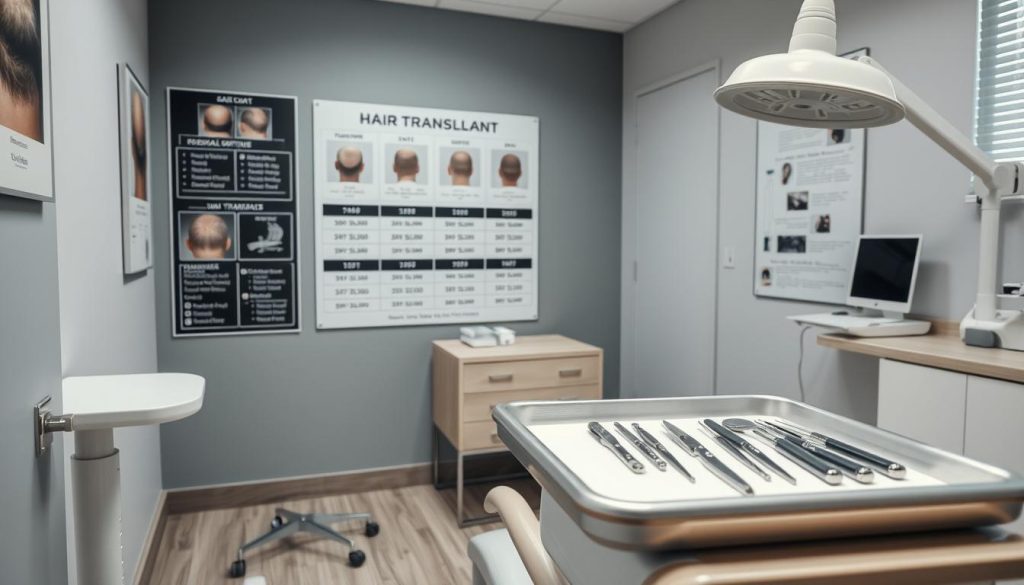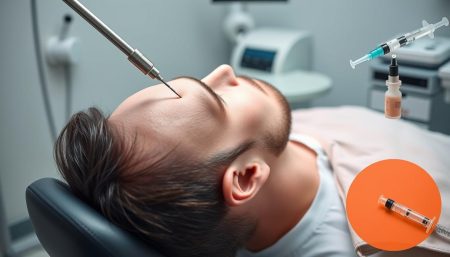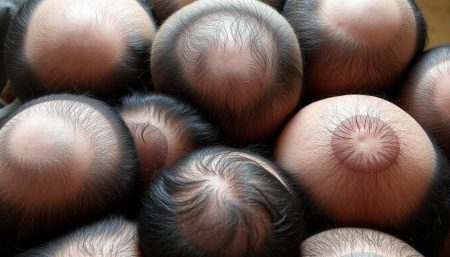Starting your journey to a fuller head of hair is exciting yet scary. It’s key to be well-prepared for hair restoration surgery. This guide will help you understand the things to do before getting a hair transplant. It combines medical advice and support, setting you up for success and a smooth recovery.
First, talk to your doctor or a certified expert to learn about the procedure. Knowing what to do before can ease your worries and ensure a good hair restoration experience.
Understanding Hair Transplant Procedures
Starting your hair restoration journey means learning about hair transplant procedures. This guide teaches you about different techniques and what to expect. It helps you regain confidence and hair.
What Is a Hair Transplant?
A hair transplant moves hair follicles from a donor site to bald or thinning areas. It’s a hope for those with severe hair loss. It aims to restore hair and confidence.
Different Techniques in Hair Transplantation
- Follicular Unit Extraction (FUE): This method takes individual hair follicles directly from the scalp without removing a strip of tissue.
- Follicular Unit Transplantation (FUT): It involves removing a small strip of tissue from the back of the head. Then, individual follicular units are extracted.
Expectations vs. Reality in Hair Restoration
Understanding hair restoration expectations is key. Modern techniques can give natural-looking results. But, knowing the limits and setting realistic goals is vital for happiness. A detailed hair transplant consultation guide helps set the right expectations and plan your procedure.
For a successful journey, follow these hair loss prevention tips: eat well, avoid harsh hair treatments, and see a hair care specialist often. These steps can make your transplant last longer and keep your scalp healthy.
Initial Steps in Planning for Hair Transplant Surgery
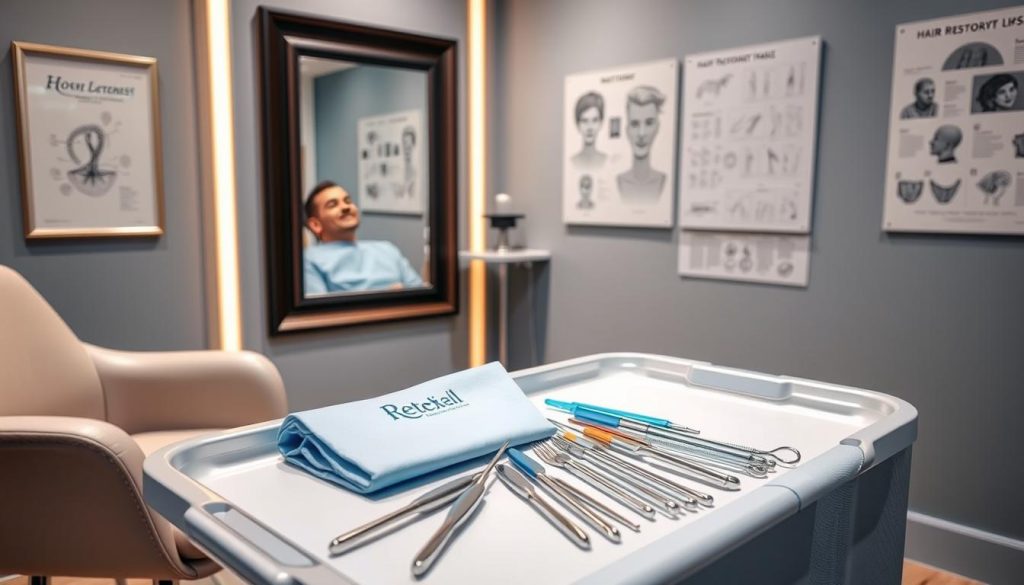
Starting your journey to hair restoration needs careful planning and a deep understanding of the process. The first steps in preparing for hair restoration surgery include research, setting realistic goals, and getting mentally ready. These steps are essential for a successful outcome.
Before scheduling surgery, it’s important to learn about the long-term effects and any possible limits. This phase is about matching your hopes with what’s medically possible. You should also know the hair transplant recovery timeline, including hair growth stages after surgery and the care needed at each stage.
- Do deep research on different hair transplant methods and their success rates.
- Talk to several experienced surgeons about your hair restoration goals.
- Look at before and after photos of past patients to see possible results.
Getting mentally and physically ready is also vital. Make sure your overall health is good to help with quick healing and hair growth after surgery. This might mean changing your diet, stopping certain medicines, or treating scalp issues under a doctor’s watch.
Knowing these early steps helps build a solid base for preparing for hair restoration surgery and managing the hair transplant recovery timeline well.
Key Factors in Determining Hair Transplant Candidacy
When thinking about a hair transplant, it’s key to know what makes you a good candidate. This means looking at your hair loss and the risks and benefits of hair transplant surgery. A good hair transplant consultation guide helps you understand what to expect.
Important factors include how much hair you’ve lost, the quality of your donor hair, your age, and your health. Each of these affects how well the transplant will work. A skilled doctor will carefully check these things.
- Extent of Hair Loss: Shows how much hair you’ll need to transplant.
- Quality of Donor Area: Checks if you have enough healthy hair to transplant.
- Age: Younger people might lose more hair after the transplant.
- Overall Health: Your health can affect how well you recover from surgery.
It’s important to think about the risks and benefits of hair transplant surgery. The benefits include a permanent fix for hair loss and feeling more confident. But, there are risks like infection or hair that looks unnatural.
| Risk Factor | Potential Impact |
|---|---|
| Infection | Needs medicine, might slow healing |
| Scarring | Varies by technique; usually small with good care |
| Unnatural Look | Depends on the surgeon’s skill |
| Post-operative Pain | Usually mild, managed with pain meds |
A thorough check during the hair transplant consultation will show if the procedure is right for you. It also sets clear expectations about the risks and benefits. A reliable hair transplant consultation guide is key in getting ready for your hair journey.
How to Choose the Right Hair Transplant Surgeon
Starting your hair restoration journey means being well-prepared and finding the best surgeon. The success of your surgery depends a lot on the surgeon’s skills and experience. We’ll show you how to make a smart choice.
Qualifications to Look For
Make sure the surgeon you choose is qualified. Look for board certification in dermatology or plastic surgery. Also, check if they have specialized training in hair restoration and are members of groups like the International Society of Hair Restoration Surgery (ISHRS). These signs show they’re serious about their work and skilled.
Researching and Comparing Surgeons
Begin by looking for surgeons who focus on hair restoration. Use online directories, forums, and social media to find them. Compare their experience, techniques, and patient results to find the best fit for you.
Reading Patient Reviews and Testimonials
Reading what past patients say is very helpful. Look for comments on the surgeon’s friendliness, the support team’s efficiency, and the results. This can give you a good idea of what to expect.
Finding the right surgeon is key to a successful hair restoration journey. Take your time, do your homework, and meet several surgeons before deciding. Following these steps will help you be happy with your hair transplant.
The Importance of a Hair Transplant Consultation
A thorough consultation is key for a successful hair transplant. This first meeting sets the stage for what to expect and creates a plan just for you. It’s based on a detailed hair transplant consultation guide. You’ll learn all about the procedure and how it fits your needs.
Purpose of the Consultation
Consultations build trust and clear communication between you and the surgeon. They help figure out how much hair loss you have and talk about ways to prevent more. You’ll also share your hopes for the outcome. This is when the team decides if you’re a good fit for the surgery.
Questions to Ask During Your Appointment
- What hair transplant techniques are most suitable for my case?
- What outcomes should I realistically expect?
- Are there any possible risks or side effects I should know about?
- How can I prepare for the procedure to get the best results?
Understanding the Treatment Plan
It’s important to understand your treatment plan. It will explain the hair transplant method, the schedule, and how long it will take to recover. Knowing this helps manage your expectations and prepares you for before and after the transplant. It’s also a chance to learn about hair loss prevention tips and care routines.
Financial Considerations: Estimating the Cost of Hair Transplant Procedure
Knowing the cost of hair transplant procedure is key if you’re thinking about it. Prices change based on many things, so it’s important to understand what you might pay. Getting advice from an expert is also a good idea, and a hair transplant consultation guide can help a lot.
How much hair you lose and the method used affect the price. Here’s a look at what you might spend on different hair transplant methods. This guide is here to help you get ready for the cost of this important investment in your health and confidence.
| Technique | Average Cost Range | Comments |
|---|---|---|
| FUT (Follicular Unit Transplantation) | $4,000 – $10,000 | Strip method, leaves linear scar |
| FUE (Follicular Unit Extraction) | $6,000 – $15,000 | Individual follicle removal, minimal scarring |
| Robotic Hair Transplant | $8,000 – $12,000 | High precision, less downtime |
Other things like the surgeon’s skill, where the clinic is, and extra costs add up. Financing options are often available, making it easier to manage the cost over time.
For a detailed cost estimate, it’s best to talk to a known clinic. Using a detailed hair transplant consultation guide during your visit will make sure you don’t miss any financial details.
Evaluating the Risks and Benefits of Hair Transplant Surgery
Thinking about hair transplant surgery? It’s key to weigh the risks and benefits carefully. This helps you make a choice that fits your health and looks goals. Knowing these points is also important for preventing hair loss.
Risks of Hair Transplant Surgery include infections, swelling, and unnatural looks if the surgeon isn’t skilled. But, the benefits of Hair Transplant Surgery are real. They offer lasting solutions, better looks, and a confidence boost.
| Risks | Benefits |
|---|---|
| Infection and bleeding | Permanent hair restoration |
| Scarring and unnatural hairlines | Improvement in appearance |
| Possible pain and swelling | Boost in self-esteem and confidence |
To lower risks, follow pre- and post-op advice from doctors. This includes using special shampoos, avoiding certain meds, and eating well to aid recovery.
Deciding on hair transplant surgery needs careful thought. Talk to a hair restoration expert for advice. They can help tailor treatments to fit your needs and ensure great results.
Organizing Personal Affairs Before the Procedure
When you’re getting ready for hair restoration surgery, think about the details that help you focus on healing. Getting your personal life in order can make your recovery smoother. It ensures you follow post-hair transplant care instructions without stress.
Arranging Time off Work
First, plan enough time off from work. The amount needed depends on your surgery and how fast you heal. Talk to your boss and see if you can work from home when you’re not feeling well.
Planning for Post-Surgery Care and Assistance
Recovering from a hair transplant is more than just resting. You need to prepare your home and make sure you have support. Having someone help with daily tasks in the first days is key. Also, make sure your recovery space is comfortable and easy to get to.
Here are some practical steps to consider:
- Organize transportation to and from the clinic as driving may not be advisable immediately after surgery.
- Stock up on essential groceries and medical supplies like pain relievers and ice packs to help manage any discomfort.
- Prepare a comfortable recovery area in your home that includes plenty of pillows to prop yourself up and reduce swelling.
For more detailed guidance on how to best prepare for your surgery and ensure a smooth recovery, visit this guide on hair transplant surgery for.
| Preparation Aspect | Details | Timing |
|---|---|---|
| Work Leave | Coordinate with employer for necessary time off; consider flexible working arrangements post-surgery. | Arrange 1-2 weeks before surgery |
| Home Setup | Adjust living space for comfort and accessibility; include medications, groceries, and recovery essentials. | Setup 2-3 days prior |
| Support System | Confirm schedules with friends/family who will assist post-surgery; consider professional care if necessary. | Confirm 1 week before surgery |

Creating a Pre-Op Health and Wellness Routine
Getting ready for hair restoration surgery means focusing on your health. A good health routine can make your surgery and recovery easier. It’s all about preventing hair loss and staying healthy.
Hair Loss Prevention Tips
Before your surgery, keep your scalp clean and healthy. Use a gentle, sulfate-free shampoo. Drink plenty of water and avoid harsh chemicals.
Try to stay out of the sun and away from heat. These can harm your hair follicles.
Dietary Changes and Supplements
Your diet is key to getting ready for surgery. Eat foods that help your hair, like omega-3s, protein, iron, and vitamins A, C, D, and E. These nutrients are important for hair health.
Consider taking supplements like biotin, zinc, and selenium. But talk to your doctor first to make sure they’re right for you.
- Fatty fish: Salmon, mackerel, and sardines are rich in omega-3 fatty acids which promote hair health.
- Lean meats: A good source of protein which is essential for hair growth.
- Nuts and seeds: Almonds, flaxseeds, and sunflower seeds provide zinc and vitamins.
- Spinach and other leafy greens: High in iron and vitamins A and C.
Starting a strong pre-op health routine is a big step towards successful hair restoration. These tips help keep your hair and prepare your body for surgery. The healthier you are, the better your results will likely be.
Things to Do Before Getting a Hair Transplant
If you’re thinking about a hair transplant, getting ready is key for the best results. This guide covers important steps to take before your hair transplant. It focuses on preparing for hair restoration surgery and what to do beforehand.
- Consult a Qualified Surgeon: It’s vital to talk to a skilled surgeon in hair restoration. Make sure they have the right experience and good reviews from patients.
- Mental Preparation: It’s just as important to get ready mentally as physically. If you’re worried about how you’ll feel, consider talking to a counselor or therapist.
- Physical Health Check-Up: Before surgery, check that you’re healthy. Your surgeon will do tests to see if you’re a good candidate for the surgery.
- Nutritional Considerations: Eating well, with lots of vitamins and minerals, helps your body heal after the transplant.
- Discuss Medications: Some medicines and supplements can affect how you heal. Tell your surgeon about any you’re taking to avoid problems.
- Hair Care Routine: Start using a gentle hair care routine as advised by your surgeon. This helps prevent scalp irritation before the transplant.
By properly preparing for hair restoration surgery, you’re making the process smoother and healing better. The steps you take now will greatly affect your outcome.

Preparing for Hair Restoration Surgery: The Final Weeks
The final weeks before your hair restoration surgery are very important. They help ensure a successful surgery and a smooth recovery. Following your surgeon’s pre-surgery instructions is key to avoiding complications and getting the best results.
Pre-Surgical Instructions from Your Surgeon
In the weeks before your surgery, your surgeon will give you important advice. They might tell you to stop taking certain medications. These can affect how well you sleep or how your blood clots.
If you smoke, quitting is a must. Smoking can slow down your healing a lot.
Important considerations include managing your routine and preparing mentally for the changes to come. Here is a typical checklist that most surgeons will recommend:
- Stop taking blood-thinning medications and supplements like aspirin or omega-3 fatty acids.
- Avoid cutting or dyeing your hair as natural regrowth is important for the surgery.
- Ensure you have a comfortable recovery area set up at home that includes all necessary post-operative care instructions and supplies.
- Arrange for someone to drive you home post-surgery as you will not be able to drive yourself.
Last-Minute Preparations
Getting your home ready for recovery is also important. Think about cooking meals ahead of time or getting them delivered. Make sure you have everything you need within reach.
Set up a cozy sleeping area. Rest is vital for healing well.
It’s good to prepare emotionally too. Understand that seeing hair growth takes time. Be patient, as it can take months to see results.
Understanding the Hair Transplant Recovery Timeline
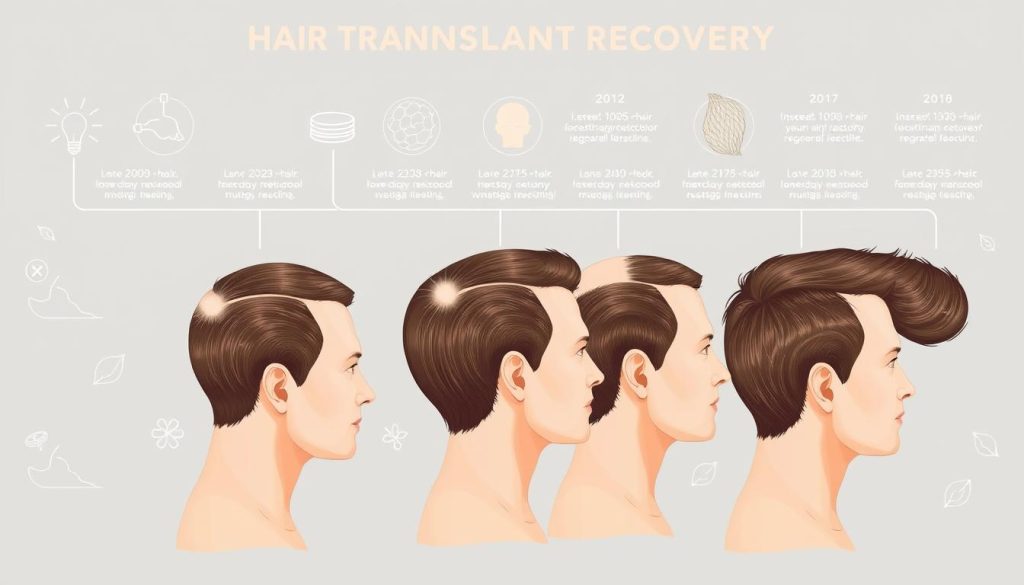
Hair transplant recovery timeline and post-hair transplant care instructions are key to healing after surgery. Each person’s recovery is unique, based on their health, the surgery’s extent, and following care instructions closely.
| Time Post-Surgery | Expected Recovery Milestones | Recommended Care Instructions |
|---|---|---|
| 1-3 Days | Scalp tightness, mild swelling | Gentle hair washing with prescribed shampoos |
| 1 Week | Decrease in scalp swelling | Avoid strenuous activities and direct sunlight |
| 2 Weeks | Sutures removal (if any), healing of donor sites | Continue to protect scalp from sunlight |
| 1 Month | Noticeable shedding of transplanted hair | Normal washing and hair care; no dyes or chemicals |
| 3-6 Months | Beginning of new hair growth | Maintain healthy diet, avoid smoking and alcohol |
| 1 Year | Mature hair growth, final results visible | Regular check-ups, possibly consider additional treatments for density |
The hair transplant recovery timeline can be tough, both physically and emotionally. Following post-hair transplant care instructions well can speed up healing and improve the look of your hair. Being patient and careful is very important during this time.
Post-Hair Transplant Care Instructions
Proper care after a hair transplant is key to its success. Following the post-hair transplant care instructions is essential. This helps your hair grow well and last longer.
Before getting a hair transplant, it’s important to know about recovery. After the transplant, avoid activities that could harm the grafts. This means no hard exercise, direct sunlight, or harsh hair products.
Also, sleep upright to reduce swelling. Eating right is important for your body’s recovery. Your doctor will tell you what to do.
Knowing the healing time and keeping up with doctor’s visits is vital. Being careful and following your doctor’s advice helps a lot. Remember, recovery takes time and gentle care.
Stay patient and focused on your hair care. With dedication, you’ll see great results. You’ll have a fuller, natural-looking hair and feel more confident.
FAQ
Q: What are the essential things to do before getting a hair transplant?
A: Before getting a hair transplant, research the procedure and understand the different techniques. Choose the right surgeon and set realistic expectations. Ensure good health, quit smoking, and avoid certain medications.
Also, arrange for post-surgery care and assistance. This is important for a smooth recovery.
Q: How do I understand the various techniques used in hair transplantation?
A: The two main techniques are Follicular Unit Extraction (FUE) and Follicular Unit Transplantation (FUT). They differ in how hair follicles are extracted and transplanted. Learning about these methods helps you discuss your options with your surgeon.
Q: What is the importance of the initial consultation for hair transplantation?
A: The initial consultation is key. It allows for a thorough evaluation of your hair loss and a discussion of your expectations. You can also address all your queries and concerns about the procedure, risks, and benefits.
Q: How can I find the best hair transplant surgeon?
A: Research the surgeon’s qualifications, experience, and board certifications. Look at before-and-after photos of past patients and read reviews. Choose a surgeon who specializes in hair restoration and with whom you feel comfortable.
Q: What are the risks and benefits of hair transplant surgery?
A: The benefits include permanent hair restoration and enhanced self-confidence. Risks include infection, scarring, and unnatural-looking results. Discussing these with your surgeon helps manage expectations and prepare for the outcome.
Q: How do I prepare for the days leading up to my hair transplant surgery?
A: In the days before your surgery, follow all pre-surgical instructions from your surgeon. This may include avoiding blood-thinning medications and alcohol, getting plenty of rest, and planning for post-operative care. Ensure you have a comfortable space at home for your recovery.
Q: Can I prevent hair loss before a transplant?
A: While genetic hair loss cannot be entirely prevented, maintaining scalp health is important. A balanced diet, avoiding harsh chemical treatments, and using medically recommended products can slow down hair loss and improve hair health.
Q: What should I expect in terms of hair transplant recovery time?
A: Recovery time varies, but most patients need a few days to a week off from work. Swelling and soreness are common in the first few days. Full recovery and hair growth take several months to a year. Your surgeon will provide a detailed recovery timeline.
Q: What are the post-hair transplant care instructions?
A: Post-hair transplant care includes sleeping in an upright position for the first few nights and avoiding strenuous activities. Do not wash your scalp until advised by your surgeon. You’ll also receive instructions on how to care for the wound areas, take prescribed medications, and protect the scalp from the sun.
Q: How much does a hair transplant procedure cost?
A: The cost of a hair transplant procedure varies based on the extent of the transplant, the technique used, and the location of the clinic. Discuss costs with your surgeon during the consultation and inquire about financing options if needed.












